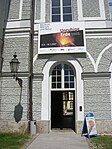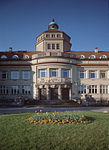Ukrainian Free University
1921 establishments in AustriaEducation in PragueEducational institutions established in 1921Minority schoolsRelocated schools ... and 6 more
Ukrainian Free UniversityUkrainian diaspora in GermanyUkrainian languageUkrainian studiesUniversities and colleges in MunichUniversities and colleges in Vienna
The Ukrainian Free University (Ukrainian: Український Вільний Університет, German: Ukrainische Freie Universität, Latin: Universitas Libera Ukrainensis) is a private graduate university located in Munich, Germany.
Excerpt from the Wikipedia article Ukrainian Free University (License: CC BY-SA 3.0, Authors).Ukrainian Free University
Barellistraße, Munich Nymphenburg
Geographical coordinates (GPS) Address Phone number Website External links Nearby Places Show on map
Geographical coordinates (GPS)
| Latitude | Longitude |
|---|---|
| N 48.16366 ° | E 11.50938 ° |
Address
Ukrainische Freie Universität
Barellistraße 9a
80638 Munich, Nymphenburg
Bavaria, Germany
Open on Google Maps









